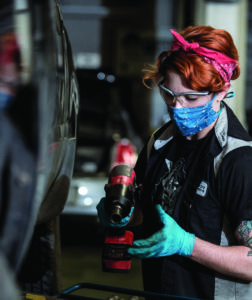Dunwoody Safe
CARES Act Higher Education Emergency Relief Fund Information
CRRSA Act Higher Education Emergency Relief Fund (HEERF II) Information
American Rescue Plan (ARP) Higher Education Emergency Relief Fund (HEERF III) Information
More Information
Testing
The Minnesota Department of Health is making at-home saliva tests available to all Minnesotans.
The saliva test checks whether you have COVID-19 right at the time you get tested and can spread it to others. It is not an antibody test that looks for whether you have had COVID-19 in the past, MDH says.
If you would like to get an at-home test, click the link here.
For more information about at-home testing, click here.
Visit the Minnesota Department of Health for other testing options.
Improved Air Quality
Recognizing the importance of improved air ventilation in preventing the spread of the coronavirus, Dunwoody has taken steps to nearly double the volume of outside air that’s circulated in its buildings through its ventilation system. Dunwoody has installed upgraded air filters which are able to capture smaller particles, including viruses and bacteria.
The College has also installed a product in its air handlers that contains a special blend of activated carbon for removal of Volatile Organic Compounds (VOCs) and other indoor pollutants to improve the indoor air quality.
Visiting Campus
Face Coverings
Face coverings/mask are optional on the Dunwoody campus. Face masks are encouraged when in a crowded setting, when social distancing is not possible, and for those who are immunocompromised or at high risk for complications associated with COVID-19.
The College will continue to monitor the community risk level to determine the need for masks. Masks will not be required when the community risk level is low (green or yellow), but if the risk level climbs back to red (high) masks could once again be required.
Health Screenings
Employees and students are encouraged to self-monitor for signs and symptoms of COVID-19. By entering the Dunwoody buildings, students, employees, and guests are affirming the following:
- They are not experiencing any COVID-19 symptoms
- They have not come into close contact with anyone who has COVID-19 or COVID-19 symptoms
Asking Everyone to Do Their Part
- Stay home if you are sick
- Wash your hands
- Cover your cough or sneeze
Guided by the Experts
Dunwoody’s guidelines, actions, and protocols all meet or exceed guidelines established by the Centers for Disease Control and Prevention and the Minnesota Department of Health.
Vaccinations
Dunwoody College is highly encouraging its students to be fully vaccinated prior to the start of the semester, in order to prevent community spread. If you have questions about where and how to receive a vaccine, you can reach out to Student Affairs for available resources.
COVID-19 FAQ
How to protect yourself and others?
Here are the guidelines from the Centers for Disease Control & Prevention (CDC):
- Get vaccinated
- Wear a mask if you are not fully vaccinated
- Avoid close contact with people who are sick
- Wash your hands often
- Cover coughs and sneezes
- Monitor your health daily
What should I do if I have flu or cold symptoms?
First, you should stay home.
Second, you should monitor yourself for the symptoms identified with COVID-19. That includes fever, cough, and shortness of breath.
What should I do if my symptoms suggest I could have COVID-19?
Please contact your primary health care provider.
I’m feeling anxious about this situation. What can I do?
Students can use AllOneHealth, which offers FREE, confidential 24/7 support for any problem that can be challenging their emotional health, well-being, or focus. The number is 1.800.756.3124. No issue is too big or too small.
Employees can call our Employee Assistance Program at 800.316.2796 for confidential consultation and resource services. Or visit mutualofomaha.com/eap.
In addition, The College offers Learn to Live, a free 100% confidential online program. Visit https://www.learntolive.com/partners and enter the code DUNWOODY.
Is there a plan in place for if a student gets sick? Will the people they came in contact with have to quarantine?
In the event of a student or employee testing positive for COVID-19, the College is prepared to perform contact tracing and will notify all individuals known to have come in close contact with the individual. Those individuals who are not fully vaccinated may be required to quarantine before being allowed to return to campus.
What if I get sick? Is there a plan to help so I do not get behind or penalized for missing school?
In the event that a student becomes ill during the course of the semester, they should notify their faculty who will then work with them to develop a plan to make up any lost or missing time to ensure they are able to complete their semester.

